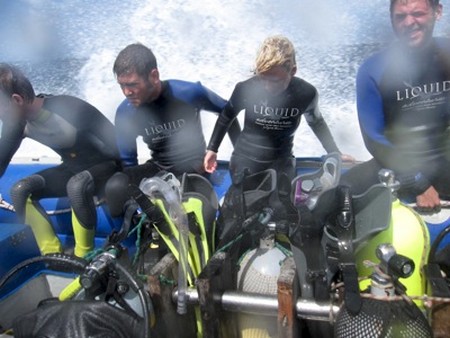If you become ill just before setting off on an expensive diving trip or while you are away, it can ruin your holiday. However, there are things you can do to help yourself.
Coping with a cold
You can’t stop people coughing their cold germs on you, especially in the confined space of an airplane. If you think you’ve got a cold coming on, you need to do something about it as an infection can stop you from clearing your ears.
Prevention is better than a cure. You can boost your immune system and prevent colds by eating plenty of foods that are rich in vitamin C, such as most fruit and vegetables, and consuming friendly bacteria, such as those in live yogurt. Garlic contains super-nutrients that block the action of the enzymes that allow viruses and bacteria to invade the respiratory tracts and lungs.
If you get a cold and your sinuses are blocked up, take a decongestant pill an hour before diving but make sure that it is a type that has been tested for use under pressure.
Ear problems
You may be surprised to learn that some types of chewing gum can help stop ear infections. Sugar-free gum that contains the sweetener xylitol has been proven not only to reduce the chances of tooth decay but also to prevent ear infections. Scandinavian research has shown that xylitol can migrate into the Eustachian tubes to provide a nonstick surface that prevents the bacteria from taking hold. If you regularly suffer from ear infections, there is a mask available that stops seawater coming into contact with your ears. It has ear pockets connected by tubes to the main air pocket of the mask and is very effective.
Too much sun
Sunburn can ruin a diving trip. You should try to stay out of the sun between dives. In the tropics, harmful ultraviolet rays will penetrate even if it is cloudy. Out at sea, the breeze will keep you cool, and you may not notice that you are burning. It is best to stay in the shade. In Australia, the motto is: ‘Slip, slap, slop!’ – slip on a shirt, slap on a hat and slop on some sunblock.
Seasickness and stomach problems
Seasickness sufferers should avoid boats that go to sea for long periods, but there are medical remedies available that can be used by divers to ease seasickness symptoms. Seasickness is caused by your senses receiving conflicting signals – your ears say you are moving when your eyes say you are not – so you should avoid sitting below deck. Everybody is susceptible to seasickness at some time. Those that seem to be fine are often busy doing many things and not focused on one detail.
Upset stomachs are common with travellers in the tropics. You should drink only bottled water or drinks that have been sealed. It is best to avoid ice, unwashed fruit, salad and ice cream. If affected, you can use oral rehydration salts to prevent dehydration.
